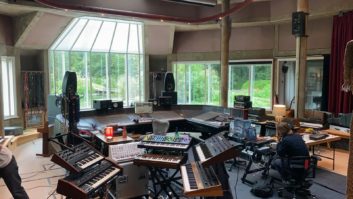
“Everything I needed to know to get through life, I learned as an assistant engineer.”
advertisement
Maureen Droney dropped this gem in my lap during a meeting at the 2013 AES show in New York City. Currently the Senior Executive Director of the Recording Academy’s P&E Wing, Droney’s engineering résumé is enviable to anyone in the biz and includes albums by Aretha Franklin, Whitney Houston, Herbie Hancock, Santana, Huey Lewis and the News, and Bobby McFerrin among many others. My curiosity was piqued.
Her comment brought to mind all the assistant engineers I’ve worked with over the years, and as many of us do, I remembered the best and the worst. This month, however, I’ll focus on the former.
With that in mind, I asked Droney to share some examples of how her early days as an assistant engineer shaped her as a person. I found her answers to be especially critical during a time when people often think that “building a studio” and becoming an “engineer” is as simple as purchasing an interface and downloading some software. Granted, with the move toward personal studios, there are fewer opportunities for up-and-comers to go through the apprenticeship process of being an assistant engineer. However, where the job does exist, the demands haven’t lessened.
“Highly developed communication skills are the most important thing I got out of being an assistant engineer, including a sense of when to speak and when not to,” she says. This is probably one of the toughest lessons to learn for millennials, the so-called “entitlement generation,” who are used to sharing their opinions openly. You have to learn to listen and stay engaged throughout a session, even when it slows to a crawl.
If you’ve watched professional tennis matches, you’ve seen a person run out from the sidelines to grab the ball when it’s out of play, then dash back to where they started. The best assistant engineers work like that: They notice when the vocalist’s headphone cable is in the way or a mic stand is beginning to sag, and immediately take care of the issue without having to be asked. Then they get out of the way. They know better than to let something—including themselves—become a distraction to the creative process. And like Radar O’Reilly on M.A.S.H., they know what the engineer will ask for before he or she says anything.
“But much, much more than that,” Droney continues. As an assistant engineer she gained “a highly developed work ethic: the ability to work really, really hard, and to push yourself far beyond what you’d ever thought you could do.” While most people reading this magazine know that the assistant engineer often puts in the most hours—setting up before everyone arrives; tearing down after everyone leaves—the list of new candidates shortens significantly once they learn that this glamorous job will involve 12- to 16-hour days, seven days a week during the project cycle.
“A commitment to excellence.” If it goes without saying, Droney wouldn’t have said it. Yet, she makes it clear that you must learn to strive for the best. That extends to all aspects of your work, being meticulous at every level. In studios where different engineers come in each day, every aspect of the studio has to be normalized after a session, from correctly winding cables, boxing up the mics and putting everything away, to taking out the garbage and making sure the next crew finds a pleasant and inspiring environment. When something doesn’t work, you mark it and make sure it’s fixed before it returns to regular use. All of the details count, not just Pro Tools key commands and EQ settings.
In terms of long-term importance, you cannot ignore her next comment: “Setting goals and accomplishing them (that is, getting the job done), stemming from the team effort necessary to get the record made!” Planning, follow-through, and the ability to collaborate—three life skills that are almost guaranteed to lead to success.
“Certainly perseverance, and tenacity, too.” Unless you want to remain an assistant engineer in perpetuity, you figure out the technologies you don’t understand, work past the rough projects and difficult clients, and remain a step ahead of your peers.
As Droney suggests, this is not simply a list of professional codes of conduct, but behaviors of successful people—behaviors that are rare within the general populace. It’s the 20 percent beyond Woody Allen’s famous quote that “80 percent of success is showing up.”
But once you have internalized these skills on the job, can you put them to use in your life? It’s easy to answer in the affirmative, but it can be difficult to maintain them as you get older and other aspects of existence demand increasing amounts of time, energy and concentration. Are you up to the challenge?
Droney mentions one last lesson: “There is the joy of it; of making music, and working with talent and creativity, and respecting and nourishing it.” You were drawn to this profession for a reason, so don’t let the pressure of the job distract you from the bigger picture—ever. If you’re able to keep everything in perspective, you won’t even notice the studio tan you’ve developed.







